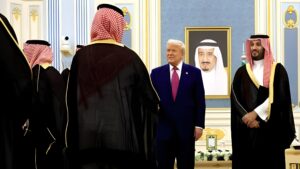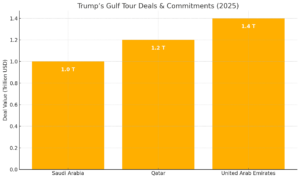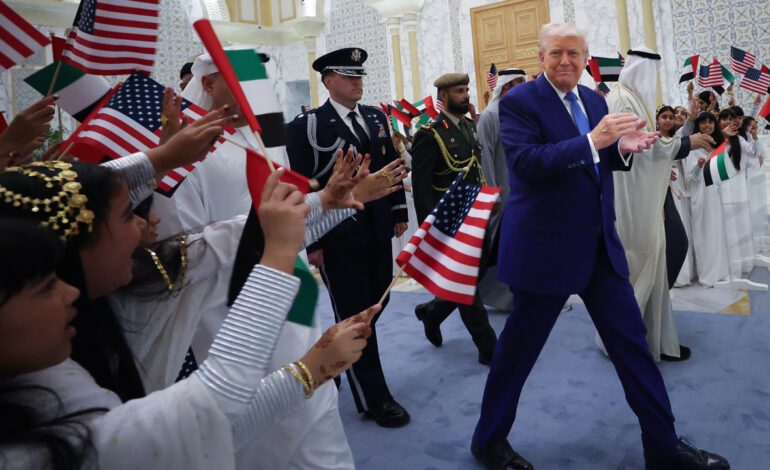In what has been described as a “historic Gulf tour”, President Trump secured record-breaking deals, investments and commitments worth nearly $4 trillion with Saudi Arabia, Qatar and the United Arab Emirates.
In addition to these massive agreements, it was announced during the visit that sanctions on Syria would be lifted — a move that could pave the way for reintegrating the Syrian economy into the global market. While Trump’s tour focused on political and security issues, the economic aspect took center stage. The president aimed to strengthen economic cooperation with the wealthy Gulf states, whose sovereign wealth funds are estimated at around $5 trillion in assets. The visit carried deep strategic economic implications, far beyond simple contracts and agreements, extending to financial and trade balances between the United States and the Gulf countries.

President Trump and Saudi Crown Prince Mohammed bin Salman interact with officials at the Saudi Royal Court. – Videograb
This is a record-breaking tour. Never before has a tour secured between $3.5 and $4 trillion in just four or five days. — President Trump in Doha
Speaking at a business forum in Doha, Trump boasted about the unprecedented scale of the deals, emphasizing their significance, according to Agence France-Presse. On Thursday, during a speech at the U.S. military’s Al Udeid Air Base in Qatar, Trump announced Qatar’s intention to purchase $42 billion worth of military equipment from the United States. This includes advanced air defense systems, combat support aircraft and drones, alongside a $10 billion investment to upgrade Al Udeid Base itself.
Trump clarified that the agreement entails selling Qatar the Terminal High Altitude Area Defense (THAAD) missile defense system, Pegasus aerial refueling aircraft and MQ-9B SkyGuardian drones. He stated that his administration is targeting $10 trillion in investments during his second term, highlighting that the Qatari government would also invest an additional $10 billion to expand the American base in Qatar. Trump reaffirmed the depth of defense cooperation between Washington and Doha.
Strengthening economic ties with the U.A.E.
Trump concluded his Gulf tour on Thursday after visiting the United Arab Emirates, where he met with U.A.E. President Sheikh Mohammed bin Zayed Al Nahyan and other leaders. The U.A.E. is seeking American support to position itself as a global leader in artificial intelligence.
According to Reuters, there is a preliminary agreement between the United States and the U.A.E. allowing the Gulf nation to import 500,000 advanced semiconductor units annually from Nvidia starting this year. The agreement is essential for the U.A.E’s ambitions to develop cutting-edge AI infrastructure.
We aim to gather $10 trillion in investments during my second term. — President Trump
Saudi Arabia: $1 trillion in deals
The White House announced on Tuesday that Saudi Arabia had agreed to $600 billion in investments, with expectations to increase this figure to $1 trillion. While some of these projects were already underway, an additional 145 agreements worth more than $300 billion were signed during a major investment conference attended by prominent American billionaires and executives.
Among the defense agreements was a $142 billion deal for military equipment and services from more than 12 American defense companies. Furthermore, Saudi Arabia’s DataVolt committed $20 billion to establish AI data centers and energy infrastructure in the United States, while an $80 billion investment package was earmarked for collaborations with Google, Oracle, Salesforce, AMD and Uber.
In parallel, Tesla CEO Elon Musk announced that Saudi Arabia had agreed to use SpaceX’s Starlink satellite Internet services for aviation and maritime navigation. Nvidia will supply 18,000 AI chips to the newly launched Saudi-backed company Humain. Additionally, AMD unveiled a $10 billion project with Saudi Arabia to provide chips and software for AI data centers extending from the kingdom to the United States.

“This is the largest aircraft order in Boeing’s history. It’s a very good thing.” — President Trump on Qatar Airways’ $96 billion deal
U.A.E commits $1.4 trillion investment in the U.S.
Weeks before Trump’s visit to Abu Dhabi, the U.A.E. announced plans to invest $1.4 trillion in the United States over the next decade, focusing on clean energy and AI technologies. The country also announced its intention to use SpaceX’s Starlink Internet services in aviation and maritime sectors.
If all proposed Gulf deals materialize, the region is poised to become the third global AI power hub after the United States and China, according to Reuters. Emirates Airlines is in talks with SpaceX to enhance in-flight Internet services using Starlink technology, although it remains unclear whether this will be offered free to all passengers or limited to premium travelers.
Houthi escalation against Israel: Fifth strike on Ben Gurion Airport in a week
On Thursday, the Houthi movement in Yemen vowed to escalate its operations against Israel, following its fifth missile strike on Tel Aviv’s Ben Gurion Airport within a week. Despite Israel’s claims of intercepting the missile, sirens sounded across wide areas, including Jerusalem, causing panic and injuries as millions of Israelis rushed to shelters.
Houthi military spokesperson Yahya Saree announced a “qualitative military operation targeting Ben Gurion Airport in occupied Jaffa with a hypersonic ballistic missile, which successfully hit its target.” He stated the operation caused the suspension of airport activities for nearly an hour and forced millions of “Zionist settlers” into shelters.
Houthi leader Abdul-Malik al-Houthi reiterated in a speech that their military operations aim to impose an aerial blockade on Israeli airspace and a naval blockade in the Red Sea and Arabian Sea. The Houthis confirmed nine such operations using ballistic and hypersonic missiles and drones in the past week.
Israeli airstrikes on Yemen last week targeted Sanaa International Airport, power stations and cement factories in retaliation. The Israeli military stated these attacks were aimed at dismantling Houthi infrastructure threatening maritime and aerial navigation security.
Gaza war intensifies: Israel rejects U.S. proposal as death toll mounts
Meanwhile, Israel continues its brutal war on the besieged Gaza Strip. Palestinian media reported dozens of casualties, mostly women and children, from widespread Israeli bombings. The Israeli military had issued evacuation orders for thousands of patients and displaced Palestinians from health facilities and shelters in Gaza City, including Al-Shifa Hospital and several schools.
Despite international efforts to reach a ceasefire, Israeli Prime Minister Benjamin Netanyahu remains determined to pursue the war. Israel reportedly rejected a new proposal from U.S. envoy Steven Weitekamp during his visit to Doha, even though the proposal received positive signals from Hamas and mediators.
The proposal aimed at securing the release of all Israeli captives and removing Hamas from power in Gaza. However, Netanyahu continues to insist on partial deals that do not include ending the war.
Humanitarian crisis in Gaza worsens
Qatar’s Prime Minister and Foreign Minister Sheikh Mohammed bin Abdulrahman Al Thani criticized Israel’s recent attacks on Gaza, stating they demonstrate a blatant disregard for ceasefire negotiations. He also questioned the necessity of the U.S.-backed Gaza humanitarian aid distribution plan, urging instead for allowing the United Nations to deliver aid.
With Israel blocking humanitarian aid to Gaza since March, the U.S.-backed Gaza Humanitarian Foundation announced plans to begin aid distribution this month. The foundation has been in discussions with Israeli officials to increase distribution points and ensure aid reaches civilians unable to access current distribution centers.
The Gaza government issued a warning about the grave threat to civilian lives posed by Israel’s continued targeting of hospitals and health facilities, calling it a systematic crime aiming to destroy the health infrastructure and force mass displacement.
In a statement, the Gaza government media office accused Israel of issuing evacuation orders for hospitals and clinics, including the Sheikh Radwan Clinic in Gaza City, following strikes on the European Hospital in Khan Yunis. These attacks, they said, violate international humanitarian law and reflect Israel’s intention to deepen the humanitarian disaster in Gaza.






Leave a Reply